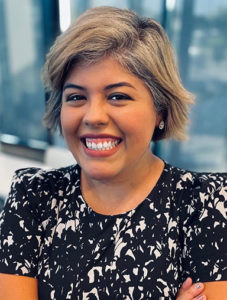• Michelle Castillo, Ed.M. • IDRA Newsletter • February 2022 •
 Since January 2021, we have seen at least 37 states introduce laws that seek to ban “divisive” content in classrooms and school libraries (Schwartz, 2022). Legislation to censor classroom learning has evolved into a call for “parents’ rights” and “curriculum transparency,” with some states now targeting words like diversity, equity and inclusion (Schwartz & Pendharkar, 2022). While we are busy playing defense, we must not lose sight of the long game and articulate clearly a vision for public education that values every single student.
Since January 2021, we have seen at least 37 states introduce laws that seek to ban “divisive” content in classrooms and school libraries (Schwartz, 2022). Legislation to censor classroom learning has evolved into a call for “parents’ rights” and “curriculum transparency,” with some states now targeting words like diversity, equity and inclusion (Schwartz & Pendharkar, 2022). While we are busy playing defense, we must not lose sight of the long game and articulate clearly a vision for public education that values every single student.
Proponents of school censorship legislation and book bans deem any curriculum that discusses race or affirms the experiences of LGBTQ+ youth as anti-American. In their version of U.S. history, slavery and racism are mere “deviations from, betrayals of or failures to live up to” (the country’s authentic founding principles (Latham Sikes & Gómez, 2022).
This is obviously a major and intentional rewriting of history. If slavery and racism are deviations from – rather than central to – the American experience, then it would follow that we do not have to acknowledge their legacy and role in our current everyday lives. We are absolved from the moral responsibility to remedy racism’s impact on our legal, education, housing and criminal justice systems.
Erasure of the past means students no longer will grapple with the effects of racism and prejudice today. Even worse, whitewashing history undermines the urgency to equip students the understand the world around them and to effect change.
And that is what is so insidious about this moment: not only is it a coordinated effort to sanitize our complicated U.S. history but it also is a removal of the tools to address the wrongs of our past, in our present. By covering up systemic inequities, proponents of school censorship legislation remove the ability of schools, public policy, the courts and governments to redress wrongs.
The current effort to institute gag orders on educators that do not comply with school censorship legislation is a rejection of the promise of the Civil Rights Act of 1964, Brown v. Board of Education of Topeka, and a multicultural vision of democracy where every student has access to equal opportunity because every student and their community are valued.
It is not enough to play defense. We must also play offense.
As we organize to beat back efforts to censor teachers, whitewash our history, and ban our books, let us offer a vision of public education that values the humanity of every child, teacher, and cafeteria and custodial support staff.
All children are born artists, curious about the world around them and wired for social interaction (Makin, 2020). Families universally want to see their children succeed and want an education that will foster empathy, curiosity and the ability to grapple with challenging issues. From solving difficult math homework to navigating the social politics of high school, we want to set up our children for future success.
We know that, for a long time, our public education system has worked for some children but not all. We know there are long-existing inequities in public schools, where children from communities with limited incomes lack access to well-funded schools and most emergent bilingual students are not prepared by their schools to graduate at the same rates as their peers. “Black students were more likely to be punished and arrested in school and to receive harsher punishments than their peers, even for the exact same behaviors” (Craven, 2020).
Laws like the classroom censorship policies make the pursuit of equitable and excellent schools for all students both more difficult and more pressing. As we organize to beat back efforts to censor teachers, whitewash our history, and ban our books, let us offer a vision of public education that values the humanity of every child, teacher, and cafeteria and custodial support staff.
At IDRA, our vision is to have an excellent public school system that values every single student and prepares them to succeed in college. We believe in a public school system that is well- and fairly-funded, that uses research-based strategies to support civil rights and build positive school climates, and that encourages authentic engagement with families.
If you share our vision, we invite you to join our community of advocates. Please sign up to receive information about our work in Texas, Georgia and across the U.S. South (https://www.idra.org/eac-south/).
Resources
Craven, M. (September 2020). The Policing of Black People Begins in Schools. IDRA Newsletter.
Makin, S. (March 2, 2020). Born Ready: Babies Are Prewired to Perceive the World. Scientific American.
Schwartz, S. (February 22, 2022). Map: Where critical race theory is under attack. Education Week.
Schwartz, S., & Pendharkar, E. (February 2, 2022). Here’s the Long List of Topics Republicans Want Banned from the Classroom. Education Week.
Latham Sikes, C., & Gómez, I. (February 2022). What Texas’ Classroom Censorship Law Means for Students and Schools. Knowledge is Power.
Michelle Castillo, Ed.M., is IDRA’s Deputy director of advocacy. Comments and questions may be directed to her via email at michelle.castillo@idra.org.
[©2022, IDRA. This article originally appeared in the February 2022 IDRA Newsletter by the Intercultural Development Research Association. Permission to reproduce this article is granted provided the article is reprinted in its entirety and proper credit is given to IDRA and the author.]


